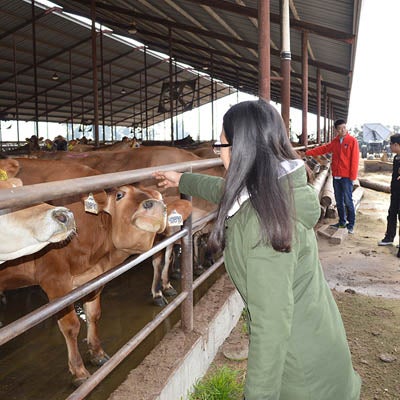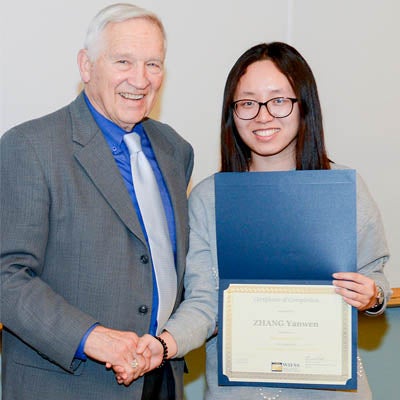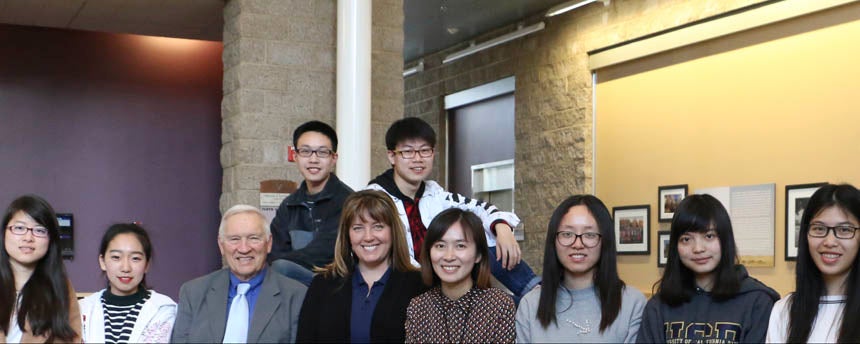“I realized that if any part of the circle should be destroyed, the balance will be broken,” said Shi Wenbo. In a way, he’s talking about the big picture of One Health and about the unique international conference he participated in this March. Undergraduate students from Nanjing Agricultural University (NAU) traveled to Davis, California, for the NAU-UC Davis graduate education conference on One Health, sponsored by the Western Institute for Food Safety and Security (WIFSS).
Wenbo continued, “It’s important to make overall plans and take all the factors into consideration by means of interdisciplinary cooperation method in terms of dealing with the food safety and related problems.”
At the conference, all factors are indeed part of the discussion: NAU students learn diverse topics including environmental health, ecology, veterinary medicine, public health, human medicine, molecular and microbiology, ecosystem health, antimicrobial resistance, dairy management and health, food safety, toxicology, and plant science and plant pathology.
The integrative approach of the conference captures the essence of the educational program among UC Davis’ School of Veterinary Medicine, College of Agricultural and Environmental Sciences, WIFSS and NAU. The program is directed at establishing a One Health Center for Food Safety and Animal Health at NAU.
Raising Awareness Takes Many Forms
Field trips
Students learn about the pre- and post-harvest systems on field trips. They observe where pathogen exposure may occur in an open environment, and how raw foods move to a more closed and controlled environment, where pathogen exposure is minimized.
At Putah Creek near Davis, California, students practiced taking water samples. Then they learned how to process the samples and screen for contamination from Ronny Bond, a field coordinator for WIFSS and water quality researcher in the UC Davis Atwill Water and Foodborne Disease Laboratory.
At Foster Farms the students learned the importance of pre-harvest poultry health in producing foods, and at Ruiz Foods they were introduced to the post-harvest management of food processing.
At the UC Davis School of Veterinary Medicine’s Teaching and Research Center in Tulare, California, the students visited a dairy where they observed the importance of animal health practices for the production of milk products.

Zhang Yanwen appreciated the trip to the dairy. She says, “I wouldn’t have the chance to see dairy cattle that provide milk for cheese, and to know how to raise these cattle scientifically and grasp the essence of the procedure of getting milk.”
Yanwen feels strongly that “animals are so important that we should spare no effort to supervise any steps of nurturing them, which is an indispensable part in One Health.”
Lectures
It’s called soil, not dirt. Soils are the root for terrestrial life. Soils are the basis for food safety and security. So, what better place to begin the awareness of the interface between animals, people and the environment than with a lecture on soils by Randy Southard, a professor of soil science in the Department of Land, Air and Water Resources at UC Davis.
Shi Wenbo found this to be one of the “inspiring” lectures.
In Southard’s words, “Soils underpin the land-based food web and are the basis for sustainable agriculture and food security. They provide nutrients and water for plants and other organisms that live in the soil, which in turn provide food for humans and other animals. Soils react with metals and other contaminants to help limit their availability and uptake by plants, and thereby play a major role in protecting food safety and water quality.”
Team projects
Team building is encouraged during the conferences through collaborative group projects where problem solving skills are put to the test. Final-day group presentations identify the area of greatest risk, the cause of the disease, and the strategy for prevention of emergence of these diseases in the future.
“During the conference all of us had a better understanding of One Health, although we come from different colleges and study different majors. I have enhanced my awareness of cooperation,” reports Pei Tongtong.
Tongtong is proud to say that “everyone in my group worked very hard and even burned the midnight oil. Finally, we completed a good group work. Through this conference, I learned teamwork was quite indispensable and I will always treasure such memorable cooperation.”
Scientists of the Future Take Food Safety Seriously

Bennie Osburn, director of Outreach and Training at WIFSS, believes One Health education will play a key role in solving food safety problems in the 21st century. These conferences are intended to initiate this type of movement in China — and they are doing just that.
Inspired by instructors during the 2015 winter conference, students returned to China and established the NAU One Health Club. The club now boasts 44 students from eight colleges. NAU club activities are posted on WeChat and university news publications. Elementary students in one Nanjing school will be introduced to the importance of food safety and the concept of One Health this fall through a program initiated by members of the NAU One Health Club. Club members entering graduate programs at Beijing, Shanghai, and Zhejiang universities will be establishing One Health clubs.
Chen Hao summarizes, “The world is still threatened by food safety severely. Besides, the best way to do with this problem is to change people’s behaviors, for each component on the earth is connected tightly, especially human. As for us, most of whom might become scientists in the future, are supposed to shoulder responsibilities. If we can’t ensure the safety of our food, then what else can we promise? I hope to see a world with safer food through our efforts.”

Related:
- What You — and Dogs — Can Do to Prevent Foodborne Illness
- 5 Food-Safety Tips for Healthy Outdoor Grilling
- Safety Net for Pastoral Communities During Drought
- Future Veterinarian Carolina Vicario Talks Cultural Awareness
- What's It Take to Do One Health Work?
Chris Brunner is a writer for the Western Institute for Food Safety and Security.